Mushrooms for Brain Function, Immunity and Stress
Medicinal mushrooms are becoming well-known and in high demand for their efficacy in calming the stress response, minimising inflammation, encouraging nerve regeneration and plasticity, strengthening healthy gut flora, supporting the immune system and providing lasting energy.
Disclaimer: The information herein is not intended to diagnose or cure any health or mental conditions. Before self-medicating we recommend you consult a qualified holistic health practitioner for guidance.
WHAT ARE MUSHROOMS?
Everybody knows the answer to this question, don’t they?… Or do they? One would think that a mushroom is some kind of strange plant because it grows from the ground and doesn’t move itself around. It’s definitely not an animal… is it? Some of you may be surprised to learn that while plants make their own food, mushrooms must eat to live. Just like animals.
Some of them eat dead matter, and some feed off living hosts, whilst others exchange water and nutrients with trees in exchange for sugars made by the tree using photosynthesis.
These facts, the way that they are immobile like plants and obtain their food like animals, means that mushrooms, along with all other fungi, belong to a whole kingdom of their own, neither plant nor animal, filled with surprising facts and intrigue.
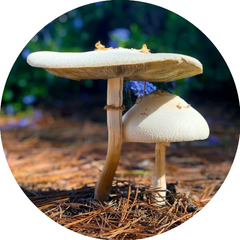
Mushrooms, also known as fungi, have been recognised by many researchers and cultures for their medicinal properties, food value, as well as used for spiritual and religious purposes. “Food for the gods” was what the Greeks called them. From the Greek physician, Hippocrates, and Chinese alchemist, Tao Hongjing, to the first North American tribes and Nigerian communities in Africa, mushrooms have been used globally across the centuries to heal and fortify. Mushroom tonics, especially for the immune system, have been used in Chinese medicine for over 3,000 years.
”Medicinal mushrooms (MM) can be defined as macroscopic fungi that are used in the form of extracts or powder for prevention, alleviation, or healing of multiple diseases, and/or in balancing a healthy diet.” ~ Source
WHY TAKE MEDICINAL MUSHROOMS?
These unassuming ‘flowers of the forest’ carry heavy duty healing compounds. This means that even in smaller amounts, you can reap the benefits of medicinal mushrooms.
Mushrooms contain many active constituents, including polysaccharides, polysaccharide peptides, proteins, terpenoids, and nucleotides. A specific polysaccharide called Beta Glucans has been studied and has been proven to be anti-tumour which means that it slows down tumour growth.
Mushrooms are also known to be anti-inflammatory and immune modulating. Just these 3 effects alone can significantly elevate your health, although, as with most natural medicine, effects can vary depending on the individual.
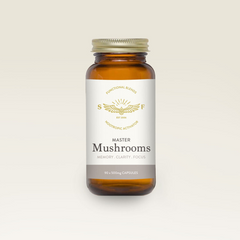
Buy Master Mushrooms 6-in-1 Functional Blend here.

COGNITION
A nootropic is a substance that enhances mental function. Lion’s Mane can not only enhance mental function, but can repair damage to the brain made by degenerative diseases. Nootropic mushrooms to use for enhanced brain function are:
★ Chaga
★ Cordyceps
★ Maitake
★ Reishi
★Oyster
IMMUNITY
Mushrooms are regarded as highly efficient at immune stimulation and modulation. It’s a complex, highly sophisticated process where they regulate the intensity of immune function, increasing and decreasing when needed. Immune modulating mushrooms to use are:
STRESS
Mushrooms are able to encourage neurogenesis and neuroplasticity in the brain, which means that, along with other factors, the brain can be reformed to adapt in response to stress. They are said to mimic beneficial neurotransmitters and reduce inflammation which also improve the stress response. Mushrooms that can help with this process are:
MEDICINAL MUSHROOMS IDENTIFIED
Mushrooms are the ultimate networkers of the world. They operate underground, unseen, where their mycelial threads connect the plant kingdom in a vast “world wide web”. Not only do they fortify the plant kingdom and clean up the forest floor by breaking down dead matter, they also provide tangible health benefits to those who eat them.
Exploring their world a bit more, we can start with the fact that there are 10 types of fungi: yeasts, rusts, stinkhorns, puffballs, truffles, moulds, mildews and mushrooms. Breaking that down a bit further, the 4 categories of mushrooms are saprotrophic, mycorrhizal, parasitic, and endophytic. Some mushrooms fall into more than one category. Medicinal mushrooms are mainly saprophytic.
SAPROTROPHIC MUSHROOMS – turning trash into treasure
These are masters of breaking down dead plant matter, specifically bark and fallen leaves. They transform this matter into nutrients, which is then shared with other organisms in a form they can use via their mycelium, which you can imagine as a root system of fine, interconnecting threads starting just below the surface of the decaying bark or soil below the layer of leaves. They live on and feed off dead matter which distinguishes them from Mycorrhizal mushrooms which grow on the roots of living plants in a symbiotic relationship.
TURKEY TAIL
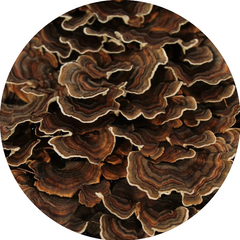
REISHI

MAITAKE
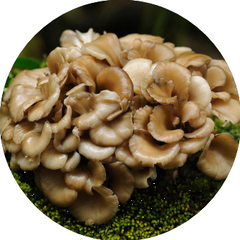
Also known as the dancing mushroom for the way mushroom hunters dance for joy when finding this prized mushroom, maitake is also known as sheep’s head, cloud mushroom and hen-of-the-woods. It’s has been shown to have anti-tumour and anti-viral effects, immunomodulation properties, support for diabetics and anti-inflammatory action. It is also said to improve the health of beneficial gut microbes, which improves immune system function.
AGARICUS BLAZEI
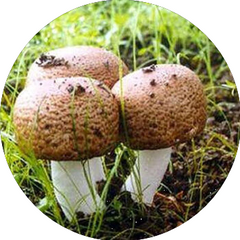
This mushroom is native to Brazil and is used medicinally in Japanese culture. It is said to be immunomodulatory and have anti-tumour, anti-mutagenic effects. Agaricus has been traditionally used to effectively treat diseases such as atherosclerosis, hepatitis, hyperlipidemia, diabetes, hypotension and dermatitis.
OYSTER MUSHROOMS
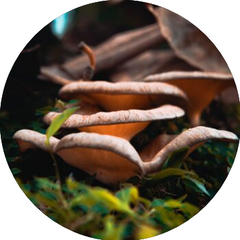
These mushrooms are one of the most beloved of the mushroom kingdom. They come in a variety of strains with delightful names – Pearl, King, Golden, Blue, Phoenix and Pink. Oyster mushrooms are not only one of the most delicious gourmet fungi, but a potent medicinal as well. Some benefits are said to be anti-fungal, anti-microbial, immune boosting and anti-cancer, as well as lowering bad cholesterol and supporting heart health.
SHIITAKE
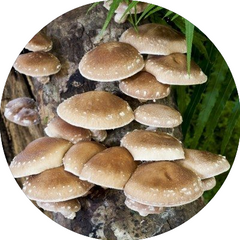
Also known as Golden Oak Mushroom, the humble shiitake is an absolute goldmine of health benefits. Aside from a rich source of nutrition, it is also said to be anticancer, immunomodulating, antiviral, antibacterial and antifungal, to name but a few. In traditional medicine, shiitake is used for lowering cholesterol and blood sugar levels, preventing hardening of the arteries and promoting cardiovascular health, among other uses.
PARASITIC MUSHROOMS – winner takes it all
These are the mushrooms which need to feed off other life forms to survive, and are said to impart no symbiotic benefit to the host which will ultimately weaken and perish. It’s a fight to the death – winner (usually the mushroom) takes it all. In this category are:
CORDYCEPS

Known as the caterpillar mushroom, and in China is called ‘Winter worm, summer grass’ because it infects the caterpillar which dies, and from it grows cordyceps which, in its early form, appears similar to a thick blade of grass. Cordyceps sinensis occurs in the wild and comes with a hefty price tag, whereas Cordyceps militaris is cultivated commercially and is more affordable.
Also known as the athlete’s mushroom because of its energising quality, this medicinal mushroom is also said to reduce inflammation, minimise the effects of ageing, strengthen the immune system and balance out a stressed system due to its adaptogenic properties.
Read more about cordyceps here.
LION’S MANE

A soft, “fluffy” mushroom, which looks something like a white pom-pom, is fast becoming a superstar in the medicinal mushroom world. Revered for its nootropic quality, Lion’s Mane is said to repair damage caused by Alzhiemer’s and Parkinson’s, and, when taken on a regular basis, is also said to clear brain fog and sharpen mental agility, as well as reduce anxiety.
Read more about Lion’s Mane here.
CHAGA
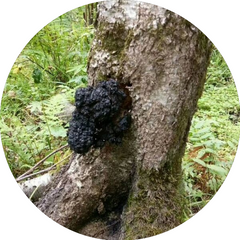
The diamond of the forest, looks nothing like a diamond, but could arguably be more valuable than a diamond if you count health as more important than a sparkly stone. The relationship with the birch tree that the “King of Mushrooms” grows on is said by some to be more symbiotic than parasitic (which would make it also Saprotrophic). This is because chaga encourages the birch tree to create a stronger immune system and visa versa, which is beneficial to both.
When broken open, the crusty black fruiting body reveals a golden-yellow inner treasure, that, when consumed, potentially fortifies the immune system, reduces inflammation and oxidative stress and increases energy.
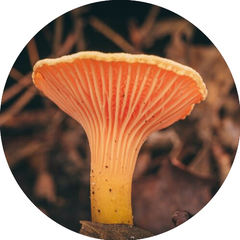
MYCORRHIZAL MUSHROOMS – living together in perfect harmony
They have a symbiotic, mutually beneficial relationship with the plants and trees on whose roots they grow – they help to form the underground communication network between plants and trees that grow in the wild. About a third of the mushrooms in our forests are mycorrhizal. They can increase the absorption capacity of a plant between 10 and 10,000 times – this means more water and nutrients which are vital to life.

ENDOPHYTIC MUSHROOMS – bringing everyone together
Mushrooms are all fungi, but not all fungi produce “mushrooms”. These never form fruiting bodies, the above-ground mushroom shapes we are familiar with, and are usually not visible to the eye unless one digs for them. They are the mycelial network made up of thread-like mycelia, just below the surface of the ground. They are a vital part of the plant kingdom. Most plants and trees have endophytic fungi growing on and around their roots, threading between their cells, connecting them to other plants and trees, providing a network to exchange nutrients and hydration, as well as communication.
HOW TO USE MEDICINAL MUSHROOMS
Besides buying fresh mushrooms when they are available, the most convenient way to get medicinal mushrooms into your diet is to take a powdered form.
Always follow the recommended dose on the product. Once you are familiar with the effects on you as an individual, you can customise the dose to your needs.
Capsules are the most convenient option for some. The advantage to using powders is that you can familiarise yourself with the flavours of what you are taking. Mushroom powders should taste earthy, not sweet or “cereal-like”.
Powders are easily consumed in coffee which is a win-win situation in that the nutrients are ushered deeper into your cells by the caffeine, and the mushrooms mitigate some of the negative effects of coffee.
You can also add them to savoury dishes, chocolates, smoothies and other hot drinks.
See recipes for:
Lion's Mane
Turkey Tail
CHOOSING YOUR MUSHROOM SUPPLEMENT: WHAT TO LOOK OUT FOR
With so many mushroom supplements on the market these days, how do you choose the best one? The more you read up about it, the more it can sometimes feel like navigating a minefield, but keeping a few simple things in mind can help.
★ Trust your brand - This can be half of the work done. Look for brands known for their attention to detail and putting in the work to source clean, quality products.
★ Bio availability - The nutrients in mushrooms are safeguarded by a biopolymer called chitin which is indigestible by humans. In a mushroom supplement this needs to be broken down by heat to make the nutrients absorbable.
★ Organic certification - Depending on where the mushrooms are cultivated in the world, contamination by chemicals, heavy metals and microbes can be a concern. Organically certified mushrooms are tested for any contaminants.
★ No hidden extras - The powder should be 100% mushroom, without hidden extras, or, if it’s an extract, the extract should be dried onto an organic or non-GM, clean substrate – often this can be maltodextrin, so make sure it’s something in alignment with your health goals.
★High in Beta Glucans - Some brands will put polysaccharide content on the label, but you want to know Beta Glucans content – this is the main health-giving component of mushrooms, which will also indicate the purity of the powder. 25 – 35% is a good amount. We tested our Lion’s Mane and it scored above 50%.
SOURCES
- https://grocycle.com/medicinal-mushrooms-the-complete-guide/
- https://www.realmushrooms.com/best-mushrooms-for-anxiety-fungi-for-calming-the-mind-body/
- https://www.ncbi.nlm.nih.gov/pmc/articles/PMC4684115/
- https://greenmedinfo.com/blog/shiitake-mushrooms-proven-benefit-dozens-diseases
- https://www.agrifutures.com.au/wp-content/uploads/publications/04-024.pdf
- https://www.ncbi.nlm.nih.gov/pmc/articles/PMC4684115/
- https://www.realmushrooms.com/mushrooms-immune-system/
- https://www.beyondpesticides.org/assets/media/documents/Tracking%20Biodiversity%20–%20fungi.pdf
- https://encyclopedia.pub/entry/6718




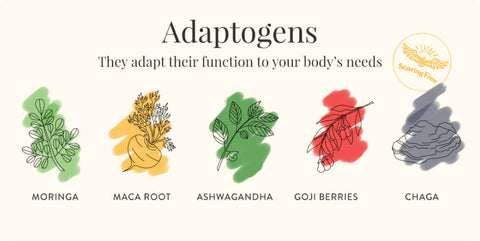
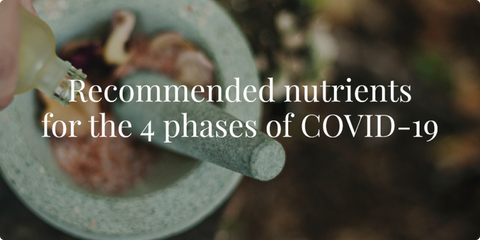

Comments (0)
There are no comments for this article. Be the first one to leave a message!